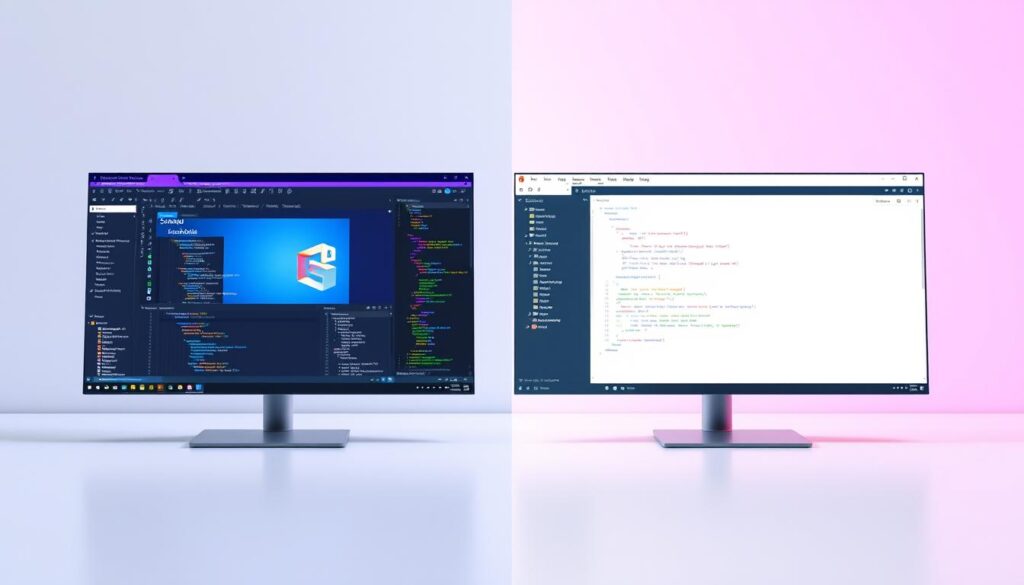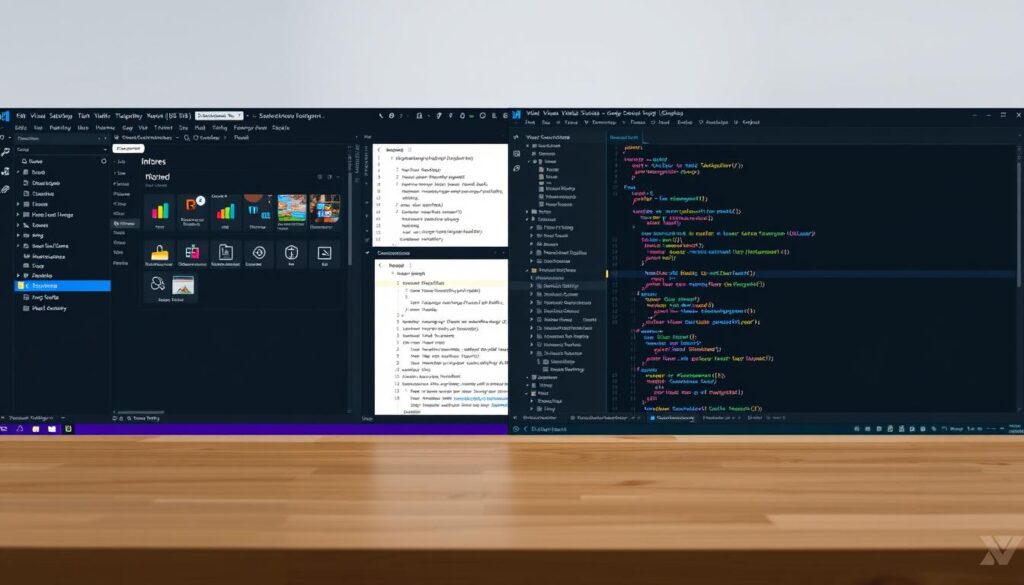
Did you know that Visual Studio is the most searched IDE, with a 27.6% share? This shows how big of an impact Microsoft’s tools have on coding.
The debate between Visual Studio vs Visual Studio Code is common among developers. Visual Studio is packed with features for big projects. On the other hand, Visual Studio Code is light and great for web development and small projects.
Visual Studio Code is perfect for web development and small projects. It’s efficient and doesn’t take up much space. Visual Studio is better for big, complex projects.
In this article, we’ll explore the main differences between Visual Studio and Visual Studio Code. We aim to help you pick the best tool for your software development needs.
Key Takeaways
- Visual Studio is the most searched IDE, showing its popularity.
- Visual Studio Code needs less than 200 MB of disk space, making it light.
- Visual Studio is great for big projects with advanced tools.
- Visual Studio Code is ideal for quick edits and cross-platform projects.
- Visual Studio is better for teamwork and big project management. VS Code is flexible with many extensions.
Understanding the Basics of Visual Studio and Visual Studio Code
Visual Studio and Visual Studio Code are top tools from Microsoft. They meet different programming needs. Visual Studio is great for big projects, while Visual Studio Code is perfect for quick edits.
What is Visual Studio?
Visual Studio is a powerful IDE for pros. It’s used for making complex software in many languages. This includes C#, F#, and Visual Basic.
It’s good for desktop, web, and mobile apps, games, and IoT projects. It has advanced debugging and testing tools. Users can also customize it with themes and shortcuts.
It works well with Git and GitHub for managing code. This makes it easy to track changes.
What is Visual Studio Code?
Visual Studio Code, or VS Code, is a fast code editor. It supports many languages with its extensions. It runs on Windows, macOS, and Linux.
It’s customizable with shortcuts and themes. It has features like multiple cursors and column selection. Its Git control makes managing code easy.
It’s great for web and cloud apps. It helps developers work quickly and efficiently. Features like Auto Save and Hot Exit make work easier.
In this detailed look at Visual Studio and Visual Studio Code, we explore their main features. We see how they help with different projects. The choice between an IDE and a code editor depends on what you need.
The Core Functionalities of Visual Studio
Visual Studio is known for its powerful tools, making it a top choice for developers. It offers key features that set it apart as an exceptional IDE.
Integrated Development Environment
Visual Studio has robust IDE features for the whole software development cycle. It helps with writing, editing code, and navigating projects easily. Its interface is user-friendly, boosting productivity.
The platform supports many programming languages and frameworks. This means developers have all the tools they need right at their fingertips.
Advanced Debugging Capabilities
Visual Studio shines with its debugging tools. These tools let developers debug interactively, getting real-time insights into code behavior. This helps solve problems quickly.
It offers various debugging options, including remote and historical debugging. This makes troubleshooting complex issues efficient.
Comprehensive Testing Tools
Visual Studio’s software testing tools ensure apps are reliable and run well. It has many testing frameworks, like unit tests and automated tests. These tools help find bugs and performance issues early.
Collaborative Development Features
Effective team collaboration is key in software development, and Visual Studio excels here. It has tools for version control, project management, and communication. This makes teamwork seamless.
Features like Live Share enable real-time collaboration. Team members can code and debug together.
Deployment Options
Visual Studio makes deployment easy with its cloud deployment options. It integrates well with Azure, allowing direct cloud deployment. This supports scalability and flexibility.
Whether it’s web apps, mobile apps, or complex enterprise solutions, Visual Studio has the tools to manage and monitor deployments.
| Feature | Visual Studio | Visual Studio Code |
|---|---|---|
| Disk Space Requirement | 2.3 GB to 60 GB | < 500 MB |
| RAM Recommendation | 16 GB | < 300 MB |
| Pricing | Free (Community), $45/mo (Professional), $250/mo (Enterprise) | Free |
| Startup Time | Longer (a few seconds to a minute) | Quick (almost instant) |
| UI Complexity | Comprehensive (potentially cluttered) | Simplified (focuses on core coding tasks) |
The Core Features of Visual Studio Code
Visual Studio Code is a lightweight code editor known for its speed and efficiency. It has many features designed to make coding easier. This is why it’s so popular among developers.
Lightweight and Fast
As a lightweight code editor, Visual Studio Code uses few system resources. This means it works quickly, perfect for fast coding and small projects. It starts up fast and runs smoothly, without lag.
Extensibility and Customization
VS Code’s biggest strength is its ability to be extended. With over 50,000 extensions, developers can customize their workspace. This customizable IDE lets users add or remove features, making coding more efficient and tailored to their needs.
Cross-Platform Compatibility
Visual Studio Code is great because it works on Windows, macOS, and Linux. This cross-platform compatibility makes it accessible to many developers. It also has a Settings Sync feature for syncing preferences across devices.
Integrated Git Control
VS Code has built-in Git support for easier version control. This feature makes code branching, merging, and committing simple. It supports many source control providers, making it great for team work.
IntelliSense for Efficient Coding
IntelliSense is a key feature of Visual Studio Code. It offers dynamic code completion and type checking. This feature helps code faster by suggesting smart solutions and checking code in real-time. It supports many programming languages, including JavaScript, Python, and C#.
| Feature | Description |
|---|---|
| Lightweight and Fast | Utilizes minimal system resources for quick coding tasks and small projects. |
| Extensibility | Offers over 50,000 extensions for enhanced customization. |
| Cross-Platform | Runs on Windows, macOS, and Linux with Settings Sync feature. |
| Integrated Git Control | Built-in support for version control with seamless branching, merging, and committing. |
| IntelliSense | Provides code completion and type checking for efficient coding. |
Visual Studio vs Visual Studio Code: The Comparison
Visual Studio and Visual Studio Code have big differences. They vary in performance, design, tools, and how developers work together. Each tool is made for different needs in coding.
Performance and Resource Consumption
Visual Studio came out in 1997 and has lots of features. But, it needs a lot of computer power. On the other hand, Visual Studio Code, launched in 2015, is light and fast. It’s the top choice for 75% of developers who need to save computer resources.
User Interface and Usability
Visual Studio has a full-featured interface, perfect for big projects. It’s great for detailed code work and fixing bugs. Visual Studio Code, however, is simpler and more customizable. It’s the favorite of 80% of web developers for its ease and flexibility.
Project Management Capabilities
Visual Studio has strong project management tools. It works well with Azure for cloud projects, which 60% of cloud developers use. It has detailed build settings and debugging tools. Visual Studio Code is simpler but can be made more powerful with extensions. It meets different project management needs.
Collaboration and Teamwork
Both IDEs are great for teamwork but in different ways. Visual Studio has advanced team features for big teams. Visual Studio Code, however, has top-notch real-time collaboration tools like Live Share. This lets developers pick the best tool for their team needs.
Advantages of Using Visual Studio
Visual Studio is a top pick for enterprise development. It has many strong features for big, complex projects. Its advanced programming capabilities make it a leader in the development world. It’s great for handling big codebases, perfect for large teams on tough projects.
One big plus of Visual Studio is its easy Microsoft integration. This is great for companies using Microsoft tech like Azure and .NET. The IDE supports these platforms well, giving developers all the tools they need. Plus, it makes cloud deployment easy with Azure.
Visual Studio also has a lot of extensive developer tools. These tools help with debugging and testing, which are key for solving code problems. The IDE also has testing tools to make sure apps work right.
Collaboration is another strong point of Visual Studio. Tools like LiveShare let teams work together on code, boosting productivity. It also works well with version control systems like Git, making teamwork smoother.
Visual Studio is great at handling big codebases and has many tools. It’s no surprise it’s popular, with a 28% share-of-search on Google Trends. Its wide range of features makes it the top choice for big, complex apps.
- Advanced programming capabilities boost productivity and tackle tough tasks.
- Seamless Microsoft integration means it works well with Azure and .NET.
- Extensive developer tools cover everything needed for full-stack development.
In short, Visual Studio is key for big development projects. It has everything needed for debugging, testing, and deployment. Its features and performance are what teams need to do well.
Advantages of Using Visual Studio Code
Visual Studio Code (VSCode) is a lightweight editor that offers a flexible coding environment. It’s perfect for web developers and smaller to mid-sized projects. VSCode works fast on macOS, Windows, and Linux, unlike its heavy counterpart, Visual Studio.
It needs less than 1 GB of RAM and takes up little space on your hard drive. This makes it ideal for developers with limited resources.
VSCode is great for cross-platform development. It lets developers work smoothly on different operating systems. This means they can keep their work environment the same, no matter the platform.
It also works well with Git for version control. This makes it easier for developers to manage their code directly in the editor.
VSCode is very extensible. It has a huge extension marketplace where developers can find tools to fit their needs. These tools support many programming languages and frameworks, making work more efficient and adaptable.
Being open-source, most extensions are free. This makes VSCode a budget-friendly choice for developers.
VSCode supports web technologies and languages like JavaScript, TypeScript, Python, and C++. It has features like syntax highlighting and auto-indentation to help developers work faster.
Also, VSCode is free, unlike Visual Studio’s paid versions. This makes it attractive for web development, cross-platform apps, and small to medium projects. Its performance, customization options, and plugin support make it a strong choice.
Main Differences Between Visual Studio and Visual Studio Code
When we compare Visual Studio and Visual Studio Code, we look at how they use resources, how customizable they are, and their design. This helps developers pick the best tool for their projects.
Resource and Disk Space Requirements
Visual Studio, launched in 1997, needs a lot of resources and disk space. It requires an ARM64 or x64 processor, at least 4 GB RAM, and 850 MB of disk space. On the other hand, Visual Studio Code, introduced in 2015, is much lighter. It works with a 1.6 GHz or faster processor, 1 GB of RAM, and 500 MB of disk space. This makes it easier for developers to use on less powerful machines.
Customization and Flexibility
Visual Studio Code shines in customization. It has over 60,000 extensions, compared to Visual Studio’s 3,000. This huge library lets developers customize themes, keyboard shortcuts, and programming languages. Both tools are flexible, but Visual Studio Code’s open-source nature and wide range of extensions make it great for personalizing your environment. Learn more about their features in our comprehensive comparison.
Scalability and Project Complexity
Visual Studio is perfect for large projects with complex needs. It has advanced debugging, testing, and collaborative tools for enterprise apps. Visual Studio Code is better for smaller projects and quick edits. It supports JavaScript, TypeScript, HTML, CSS, and more through extensions, offering a versatile coding experience.
Integrated Development Environment vs. Code Editor
The main difference is that Visual Studio is a full-featured IDE, while Visual Studio Code is a customizable text editor. The choice depends on whether you need the extensive tools of an IDE or the flexibility of a text editor. Visual Studio is CPU-intensive and focused on Windows development, while Visual Studio Code is fast and great for web development and small tasks.
Both tools have their own strengths, and successful developers often use them together. This way, they can take advantage of each tool’s unique benefits.
FAQ
What is Visual Studio?
Visual Studio is a powerful tool for professional developers. It’s great for big projects. It has tools for debugging, testing, and building software, especially for .NET and C++.
What is Visual Studio Code?
Visual Studio Code, or VS Code, is a fast and efficient code editor. It supports many programming languages. It’s customizable and works on Windows, macOS, and Linux.
What are the main differences between Visual Studio and Visual Studio Code?
Visual Studio is for big projects and needs lots of resources. VS Code is for smaller tasks and uses less resources. VS Code is customizable and works well on different systems.
Which is better for large teams and extensive collaboration?
Visual Studio is best for big teams and working together. It has great project management and design tools. It also works well with Microsoft technologies like Azure and .NET.
How does the performance of Visual Studio compare to VS Code?
Visual Studio uses more resources and can slow down on older systems. VS Code is fast and uses less resources, making it better for many systems.
Can I use both Visual Studio and Visual Studio Code for web development?
Yes, you can use both for web development. VS Code is often chosen for its speed and support for web technologies. Visual Studio is good for projects that need a full IDE.
What makes Visual Studio ideal for enterprise development?
Visual Studio is great for big projects because of its advanced tools and support for Microsoft technologies. It handles big codebases and has strong project management.
How customizable is Visual Studio Code compared to Visual Studio?
VS Code is very customizable with a big extension market. Visual Studio also has customization options but focuses more on built-in tools.
Which tool is better for cross-platform development?
VS Code is better for projects on Windows, macOS, and Linux. Visual Studio also supports cross-platform but is more for Windows and big projects.
What kind of projects should I use Visual Studio for?
Use Visual Studio for big, complex projects. It’s best for managing large teams and projects with Microsoft technologies.
What advantages does Visual Studio Code offer for small to medium projects?
VS Code is great for web development and small to medium projects. It’s fast and customizable, making it perfect for many development needs.
Future App Studios is an award-winning software development & outsourcing company. Our team of experts is ready to craft the solution your company needs.










